7 Jul 2015 | Asia and Pacific, Campaigns, Malaysia, mobile
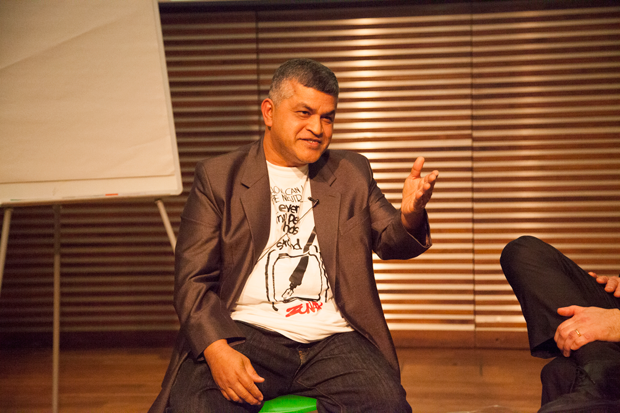
Malaysian cartoonist Zunar is facing charges under a colonial era sedition act. (Photo: Sean Gallagher/Index on Censorship)
Persecuted Malaysian cartoonist Zulkiflee Anwar Haque, who is facing nine simultaneous charges under the country’s controversial Sedition Act, has had his case pushed back until 9 September.
The artist, known as Zunar, told supporters in an email that his case had been adjourned pending a ruling from the Federal Court in a separate case that challenges the constitutionality of the Sedition Act.
The current case sees Zunar facing 43 years in prison over a tweet criticising the recent jailing of a Malaysian opposition leader. He has been targeted numerous times for speaking out against the Malaysian government in his editorial cartoons. Zunar was investigated under the sedition act for the first time in 2010, much of his work has been banned, and he has been subjected to repeated raids, arrest and detainment.
“Zunar is being prosecuted simply for exercising his right to express himself. We welcome the legal challenge to the Sedition Act; a tool the government uses to try and stifle and silence dissent from Zunar and other critics. But regardless of the outcome in that case, we reiterate our call on Malaysia to immediately drop all charges against Zunar and respect free expression,” said Index on Censorship CEO Jodie Ginsberg.
You can support Zunar by signing this petition to call on the Malaysian government to drop all charges against him and renew its commitment to freedom of expression.
See cartoons by Zunar and other international artists on the theme of free expression drawn to commemorate our 15th Freedom of Expression awards.
7 May 2015 | Denmark, Europe and Central Asia, mobile, News and features
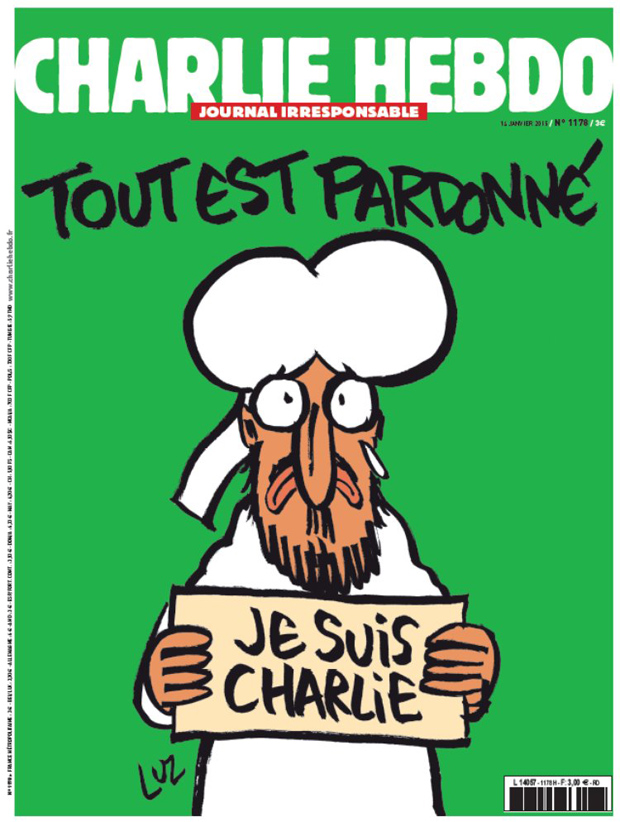
Tout est pardonne or All is forgiven, the first post attack cover of Charlie Hebdo
It’s now almost ten years since Danish newspaper Jyllands-Posten published a set of cartoons, some of which (though by no means all) depicted the Islamic prophet Mohammed. Some were flattering, some were not. One mocked jihadist suicide bombers. Another showed a schoolboy called Mohammed calling Jyllands-Posten’s editors bigots.
The idea came after it was reported that a Swedish children’s author could not find someone to illustrate her book on the life of Mohammed. Flemming Rose of Jyllands-Posten decided to commission cartoonists to draw the apparently taboo figure.
As an exercise in taboo-busting, it was bound to be controversial. But controversial though some were (one showed the prophet as a scimitar wielding menace, another a figure with a bomb for a turban) they were not shocking enough for the Danish-based radicals who decided to make a campaign of the issue. In an astonishing act of chutzpah (there really is no other word), Ahmad Abu Laban decided to fill out a “dossier” on the cartoons with even more offensive characterisations, some of which had nothing to do with Mohammed at all. He and his colleague Ahmed Akkari took the dossier to the Middle East, apparently to prove the level of anti-Muslim hatred in Denmark. Chaos ensued. The rest, the usual line would go, is history. But that wouldn’t be true: the “rest” is very much the present, and perhaps pressing now more than at any time in the past 10 years.
One wonders if Ahmad Abu Laban quite knew what he was getting us all in to. Certainly, the man, who died in 2007, was of what is now a familiar figure in western Europe. The self-publicising Muslim spokesman: the go-to guy for a controversial quote for a press not quite sure of the heat of the flames with which they were playing. Omar Bakri Muhammad, for example, was first introduced to the British public as a ridiculous fantasist in Jon Ronson’s documentary The Tottenham Ayatollah. His proteges in al-Muhajiroun provided a steady flow of enjoyably ridiculous bogeymen such as Anjem Choudary and Abu Izzadeen, who in 2006 was given the main interview on BBC Radio 4’s Today programme. Subsequent news bulletins carried his warnings of “Muslim anger” as if he were some sort of pope, rather than a fringe figure with highly dubious links.
Everyone enjoyed these outrageous figures for a while, until we realised the damage they could do. Practically every home-grown jihadist in Britain has had dealings with al-Muhajiroun. The late Laban may have known of the chaos he was about to unleash on the Middle East in 2006 with his dossier, and indeed the world ever since. He may not. His former comrade Akkari repented in 2013, saying: “I want to be clear today about the trip: It was totally wrong. At that time, I was so fascinated with this logical force in the Islamic mindset that I could not see the greater picture. I was convinced it was a fight for my faith, Islam.”
Well good, but a little late now.
Since 2005 we have been embroiled in an absurd abysmal dream. Some people draw cartoons of a long-dead religious figure. Some other people decide this has offended some sacred, though undefined, law, and so they decide that the people who drew the cartoons must be killed. Repeat. What chronic stupidity.
But of course there’s more going on here. There is more than one reason to draw or publish Mohammed drawings: from plainly making a free speech point (as many publications did after the Charlie Hebdo murders), to anti-clericalism (a la Charlie itself), to deliberate antagonism towards Muslims (a la Pamela Geller). Not all Motoons are the same.
Nor are all responses on the same spectrum. There is a world of difference between the average Muslim who may be annoyed by a portrayal of Mohammed and a jihadist who takes it upon himself to find people who have drawn these portrayals and kill them or attempt to kill them.
This is the error that has plagued the debate for the past 10 years, and came to light again in the past few weeks with PEN’s awarding of a prize to Charlie Hebdo, and the attack on a Pamela Geller-organised rally in Texas which featured a “draw Mohammed” competition.
There has been an unwitting acceptance of several dangerous ideas, chief amongst them that in order to have respect for someone as a human being, one must respect all their beliefs, and observe their taboos. But as novelist and long-time PEN activist Hari Kunzru put it: “It is not solidarity with the oppressed to offer ‘respect’ to an idea just because it’s held by some oppressed people.”
Following from this is the idea that all expression that disrespects beliefs and taboos must be driven by bigotry and racism, and that to stand against bigotry and racism is to stand against any such expression. There is a sad irony in this failure to discriminate.
On the reverse of this, some Muslims feel that free speech is now something that is being used to batter them over the head, rather than protect them. This in itself is a failure of civil society: the moment we decide everyone with a certain background and set of beliefs can be put in the “Muslim” box is the moment we ensure that those who shout loudest about those beliefs — the “extremists” — are given status. Ahmad Abu Laban, for example, claimed that his Islamic Society of Denmark represented all Danish Muslims.
So now what? As we’re approaching 10 long years of this argument, is there hope for resolution any time soon? I fear not. There can be no accommodation between those who believe in the right to free expression and those who believe “blasphemy” should carry the death sentence.
In between, if it does prove impossible not to take sides, we can at least make sure our arguments are clear and our ears are listening.
This article was posted on 7 May 2015 at indexoncensorship.org
14 Jan 2015 | Europe and Central Asia, France, News and features, Turkey
In October, Turkish cartoonist Musa Kart was the subject of a global solidarity campaign from his fellow artists. Kart was facing nine years in jail for insulting President Recep Tayyip Erodgan through a caricature for Cumhuriyet, where he commented on Erdogan’s alleged hand in covering up a high-profile corruption scandal. In response, his colleagues from around the world rallied in support of Kart, publishing their own #ErdoganCaricature on Twitter, and he was acquitted of the charges. This time, Kart is joining cartoonists in standing with Charlie Hebdo.
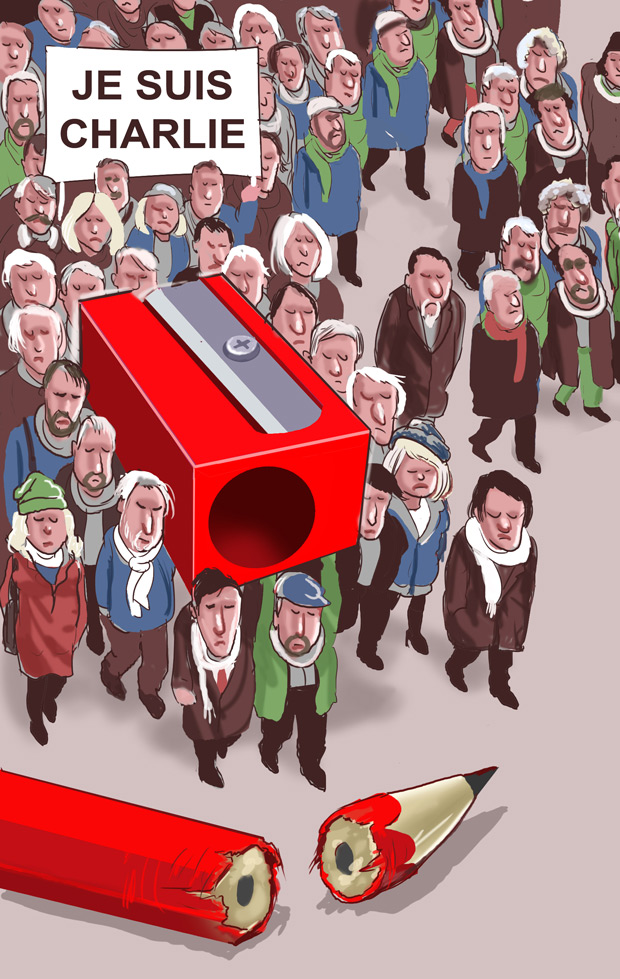
Cartoon courtesy Musa Kart
Kart told Index he feels “so sorry” and he has “lost his brothers” in last Wednesday’s brutal attack on the French satirical magazine’s offices, where 12 people — including cartoonists Stéphane Charbonnier aka Charb, Jean Cabut aka Cabu, Georges Wolinski and Bernard Verlhac aka Tignous — were killed.
Kart also ran into trouble with Turkish authorities back in 2005, when he was fined 5,000 Turkish lira for drawing then-Prime Minister Erdogan as a cat entangled in yarn. Kart puts the spotlight on Erdogan’s chequered history with cartoonists rights in a second piece, where the president declares that: “I condemn the attack. Ten years prison would have been enough for the cartoonists.”
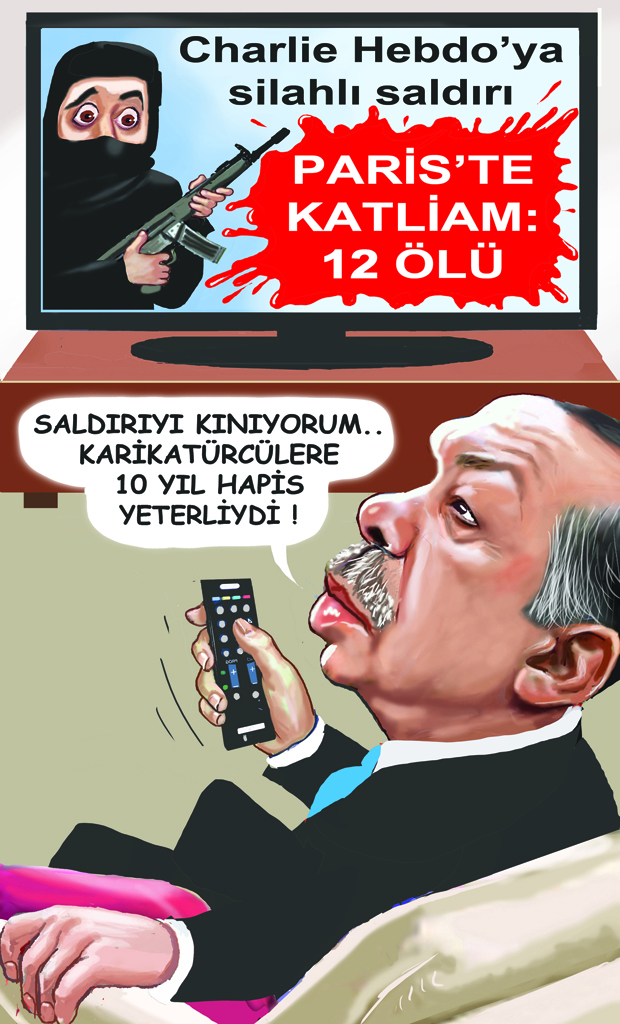
TV: “Massacre in Paris. Twelve dead.” President Erdogan: “I condemn the attack. 10 years prison would have been enough for the cartoonists.”
Erdogan condemned the “heinous terrorist attack” and Turkey’s Prime Minister Ahmet Davutoglu joined last Sunday’s march for unity in Paris. Much has been made of the apparent hypocrisy of world leaders who have suppressed free speech at home, taking part in what many considered a defiant show of support for that very right.
As Index CEO Jodie Ginsberg pointed out, Turkey imprisons more journalists than any other country in the world. Index’s media freedom map has received 72 reports of press freedom violations from Turkey since May 2014 alone. In the wake of the attacks in Paris, other Turkish cartoonists have been threatened by pro-government social media users. Police also raided the printing press of Cumhuriyet, as it prepared to publish selections from today’s issue of Charlie Hebdo.
Ecuadorian cartoonist Xavier Bonilla — known as Bonil — has also been targeted for his work. In 2013, the country got a new communications law which allows the government to fine and prosecute the media. After drawing a cartoon for El Universo, based on a raid on the home of a journalist and opposition advisor, Bonil became a victim of the new legislation. President Rafael Correa — who has been known to personally file lawsuits against critical journalists — ordered that a case be opened against the cartoonist. It found that his piece had invited social unrest and should be “rectified”, while El Universo was fined $92,000.
“I believe that humour is the best antidote to fear and the best defence against abuses of power. I have been drawing for 30 years, and I am not going to back down,” he wrote in an article in the current issue of Index on Censorship magazine.
Below are his cartoons in support of Charlie Hebdo.
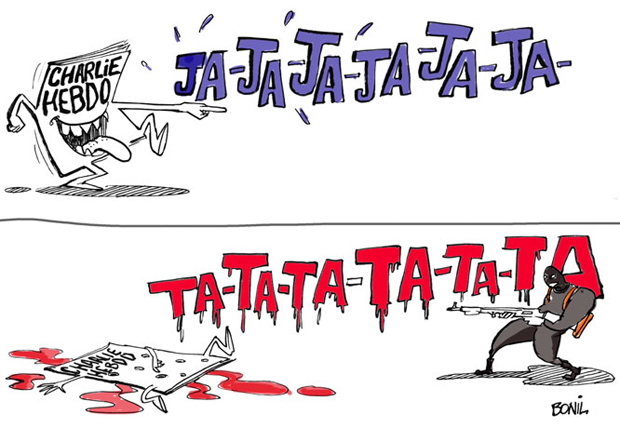
Cartoon courtesy of Bonil
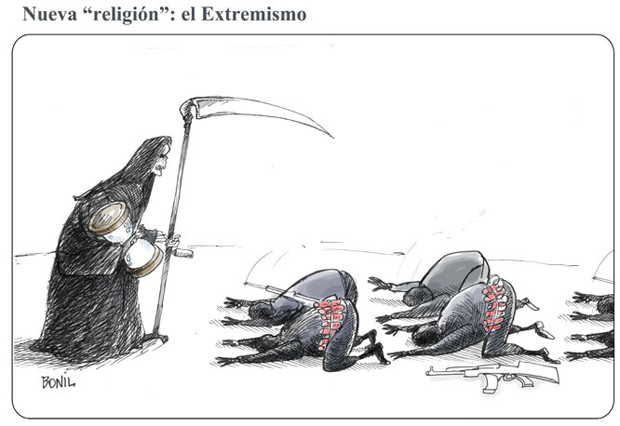
“New ‘religion’: extremism”
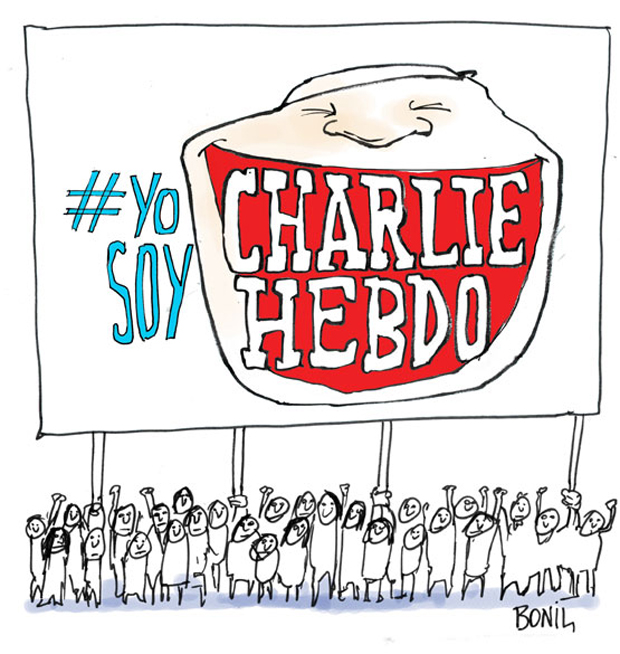
#IAmCharlieHebdo
This article was posted on 14 January 2015 at indexoncensorship.org
7 Jan 2015 | Europe and Central Asia, France, News and features
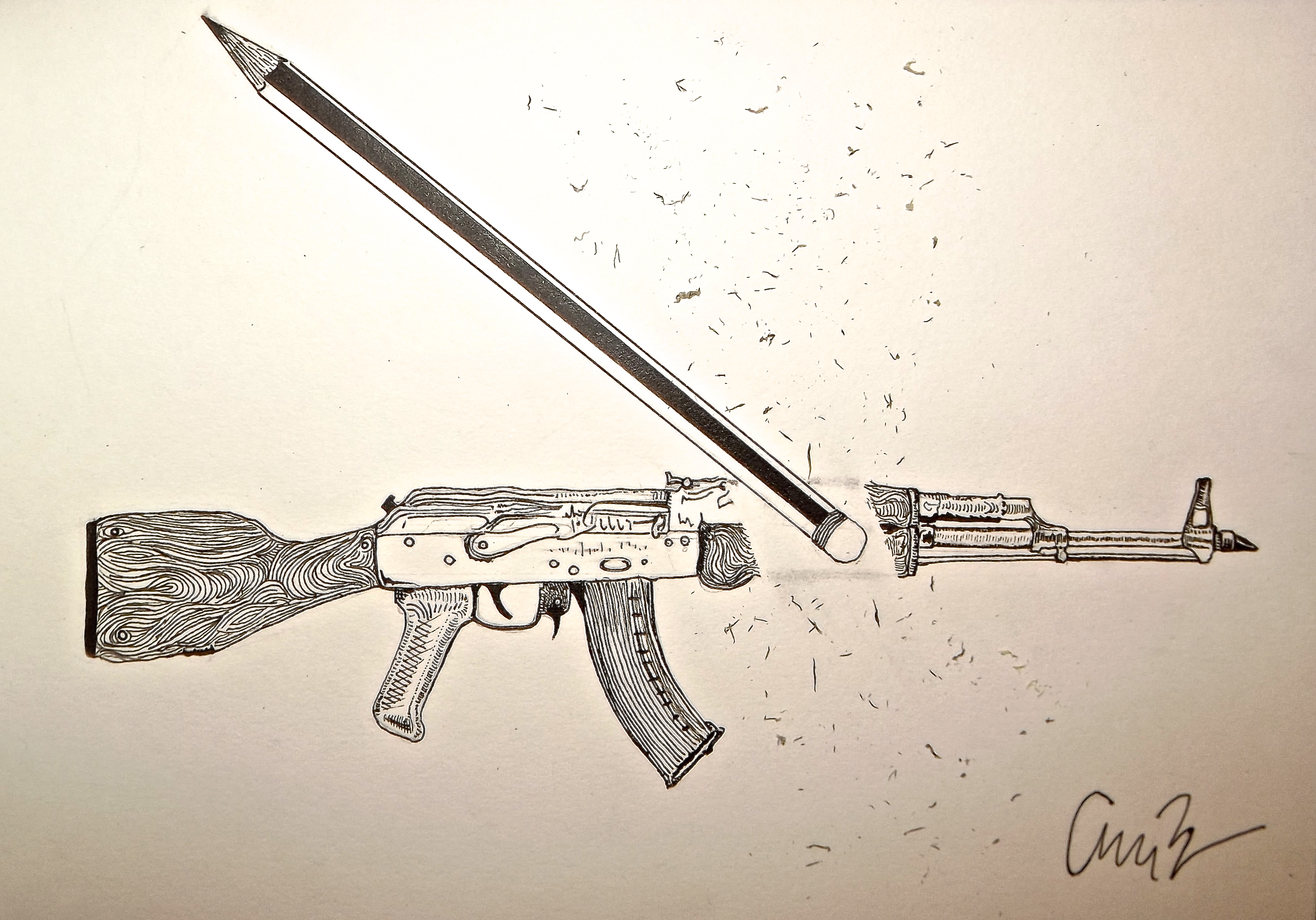
Cartoonist Charley-Kai John reflects on the attack.
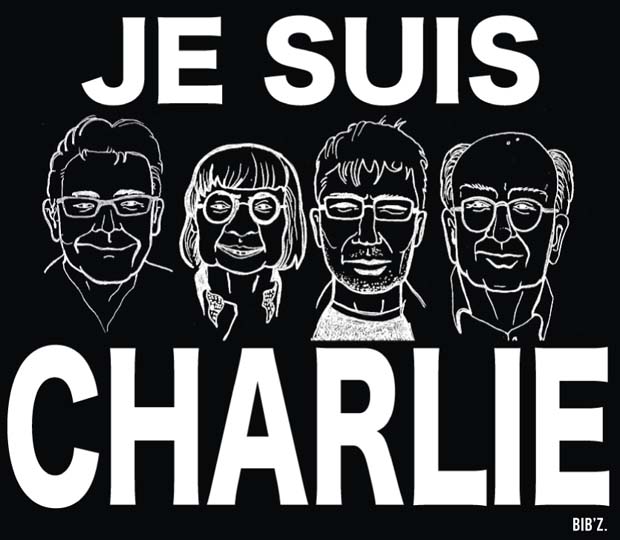
They Are Charlie: a tribute to cartoonists Bernard Verlhac aka Tignous, Jean Cabut aka Cabu, Stéphane Charbonnier aka Charb and Georges Wolinski by French artist Bib’z.
Armed men attacked the offices of French satirical magazine Charlie Hebdo on Wednesday. They killed two police officers and ten members of the magazine’s staff, including cartoonists Stéphane Charbonnier aka Charb, Jean Cabut aka Cabu, Georges Wolinski and Bernard Verlhac aka Tignous. The magazine has been targeted in the past over its controversial cartoons, including ones featuring the Prophet Mohammed. In 2011, the office was firebombed.
Index has condemned the appalling attack, saying there is nothing that could justify it. “The ability to express ourselves freely is fundamental to a free society. This includes the freedom to publish, to satirise, to joke, to criticise, even when that might cause offence to others. Those who wish to silence free speech must never be allowed to prevail,” added Index CEO Jodie Ginsberg.
Throughout the day, people from across the world have showed solidarity using the hashtag #JeSuisCharlie, while many cartoonists have supported the magazine through their art.
“Cartoonists are among the first people targeted by extremists and fundamentalists for poking fun at the sacred cows of our societies. Humour and satire are tools that close minded extremists have little defence against except by the use of weapons and murder,” Dr. Robert Russell, executive director of Cartoonists Rights Network International said in a statement.
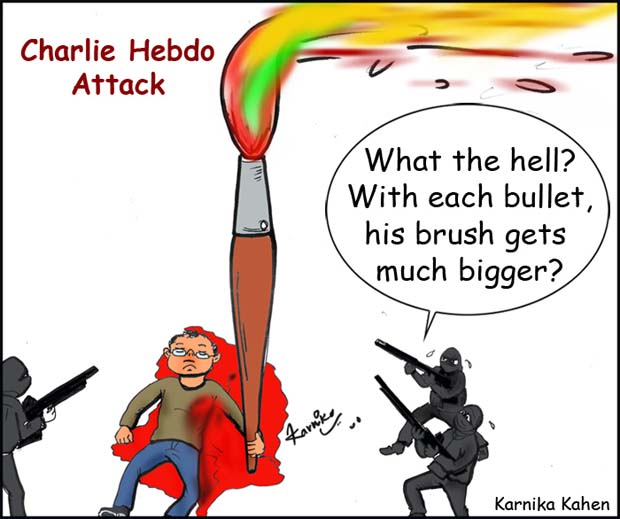
Indian cartoonist Kanika Mishra showing solidarity with Charlie Hebdo
“I feel very sad, horrified and hopeless after hearing this news,” Indian cartoonist Kanika Mishra, who drew the piece above, told Index. “One year ago, I was facing such threats when I made cartoons on [charismatic guru] godman Asaram but I never took those threats seriously. I never knew some blind followers and extremists can go to such extent. Whole world should be united against such horrific attacks on freedom of speech and its high time that we should start talking about a global policy for protecting the rights of every artist in the world.”
Martin Rowson, cartoonist for The Guardian, The Independent and Index among others, added that “we need above all else to laugh these blood-stained clowns back into the dustbin of history, and urgently.”
Below is a selection of the cartoons being shared on social media.
This article was published on 7 January and updated on 8 January 2015 at indexoncensorship.org










